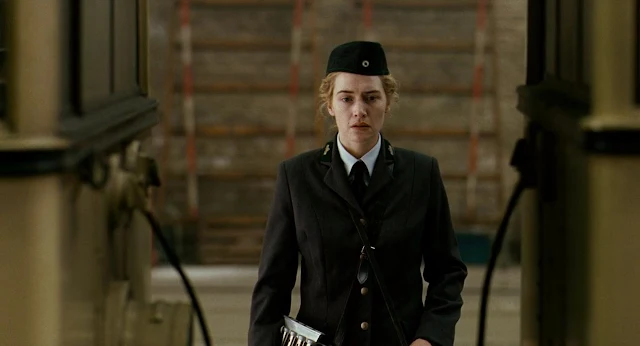The Reader (Stephen Daldry, 2008)
Cast: Kate Winslet, Ralph Fiennes, David Kross, Bruno Ganz, Lena Olin, Matthias Habich, Hannah Herzsprung, Susanne Lothar.
Screenplay: David Hare,
based on a novel by Bernhard Schlink.
Cinematography: Roger Deakins, Chris Menges.
Production design: Brigitte Broch.
Film editing: Claire Simpson.
Music: Nico Muhly.
I haven't read the novel by Bernhard Schlink, but it seems to have presented the filmmakers with two problems they never quite solved. One is technical: How do you deal with the structuring of the story as the reminiscences of a middle-aged man about his youthful affair with an older woman? Do you cast one actor and make him younger or older with makeup? (Digital aging or de-aging, despite its use in films like Peyton Reed's 2015 film
Ant-Man, in which Michael Douglas was "youthened," hasn't quite reached the level needed for a film like
The Reader, in which Michael Berg ranges from his mid-teens to his 50s.) Or do you cast two actors, even though the audience knows that 18-year-old David Kross could never grow up to look like Ralph Fiennes? The solution reached by the producers of
The Reader was to trust in an audience's suspension of disbelief and the skill of the actors. Thanks to the latter, it almost works. But a more serious obstacle is how to deal with the moral complexities presented by any story that involves the Holocaust. In
The Reader, we're presented with the problem faced by Michael Berg: reacting to the revelation that the woman who provided his sexual initiation was a war criminal. On the page, such an ethical dilemma can be explored in many ways because the reader has time to reflect on its implications. But movies demand a more immediate and visceral reaction, and the film version of
The Reader runs the risk of trivializing the moral issues it raises. Are we to excuse Hanna Schmitz's heinous actions because she was struggling with her own insecurities? Are we to think that literacy is a cure for moral blindness? David Hare's screenplay is too intelligent and Stephen Daldry's direction too sure-footed to keep us from veering off into such reductions to absurdity, but nevertheless the filmmakers seem to me to have bitten off more than they can chew in taking on a story that can't be summed up glibly. Fortunately, the acting is uniformly fine, and the film earned Kate Winslet the Oscar that had eluded her on five previous nominations. Kross is exceptionally good as well, convincingly moving from love-smitten adolescent to conscience-stricken young adult. Fiennes does what he can with the thankless role of vehicle for an extended flashback.
























